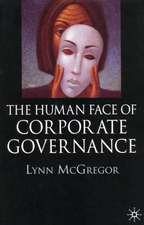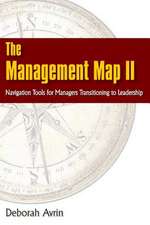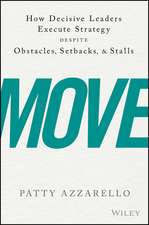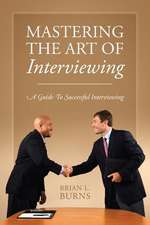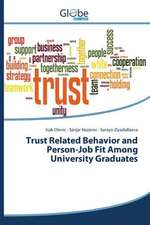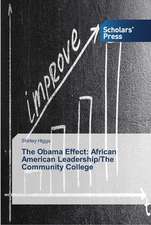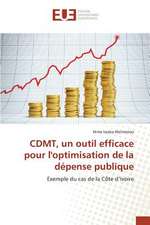Rise
Autor Patty Azzarelloen Limba Engleză Paperback – 12 iun 2012
GET YOUR BREAKTHROUGH
Patty Azzarello became the youngest general manager at Hewlett-Packard at age thirty-three, ran a $1 billion software business at thirty-five, and became a CEO at thirty-eight-all without turning into a self-centered, miserable jerk.
In Rise, Azzarello shares the insider secrets to advancing your career (while having a life) in three practical steps:
DO Better: Set Ruthless Priorities, work and lead more strategically, and deal with frustrating obstacles and stupid people.
LOOK Better: Build your credibility with the people who can help (or blacklist) you.
CONNECT Better: Develop your network without being political. Get on "the List" of people who get the best opportunities
Whether you are just starting up the corporate ladder, stuck midcareer, transitioning, or eyeing the corner office, Rise shows you the difference between getting ahead and just working hard.
Preț: 77.72 lei
Preț vechi: 90.72 lei
-14% Nou
Puncte Express: 117
Preț estimativ în valută:
14.88€ • 16.16$ • 12.50£
14.88€ • 16.16$ • 12.50£
Carte disponibilă
Livrare economică 31 martie-07 aprilie
Livrare express 14-20 martie pentru 42.23 lei
Preluare comenzi: 021 569.72.76
Specificații
ISBN-13: 9781607742609
ISBN-10: 1607742608
Pagini: 278
Ilustrații: illustrations
Dimensiuni: 162 x 231 x 19 mm
Greutate: 0.47 kg
Ediția:Ten Speed
Editura: Ten Speed Press
ISBN-10: 1607742608
Pagini: 278
Ilustrații: illustrations
Dimensiuni: 162 x 231 x 19 mm
Greutate: 0.47 kg
Ediția:Ten Speed
Editura: Ten Speed Press
Notă biografică
PATTY AZZARELLO is a successful Silicon Valley executive who now runs her own management consulting company, leading business transformations and positively impacting the careers of thousands of people across the world. She lives in Carmel Valley, California. Visit azzarellogroup.com.
Extras
WHY I WROTE THIS BOOK
I wrote the book that I wished I had been able to read as I was building my own career. I want to help people get further, faster, and be more satisfied with their work. There were four real motivators for the book.
1. TELL ALL THE SECRETS
I was very fortunate to get a lot of help from smart people who cared about me along the way. Because of that, I was told a lot of important things that no one else was. Without executive-level, personal mentors, most people don't ever get to learn about what really matters and what really works. They don't learn how to avoid the common pitfalls or get the insights they need to survive the confusing and rough times.
So I want to give away all the secrets-all the executive, insider information that is typically shared with only a select few people who get taken under a mentor's wing.
2. I HATE WASTED TIME
I hate wasting anything, particularly time, energy, and potential. So I don't like to see people wasting time, investing their heart and energy, but not getting anywhere-and, in fact, burning career capital.
You see, I am a maximizer through and through. What I mean by that is that I am driven to find the most direct and effective path to accomplish things and then do them the best they can be done, whether that is being a CEO or making a tuna sandwich.
As such, I invest enormous amounts of time, thought, and energy to figure out how to do something an easier, faster, or better way. I refuse to let my time get burned up on things that don't make a big difference or have a significant payoff. So I've spent a lot of the last twenty-five years figuring out how to tune my actions and invest my efforts to maximize the payoff for the businesses and for my career.
I know what works. I got there. I know how you can get the career you want. Through all my learning, mistakes, failures, embarrassments, wins, and advances (and maximizing) along the way, I've broken the code. I have defined and developed a concrete, practical, and repeatable approach for building the success you want. I've learned how to benefit both my business and my career and not get killed in the process. And I want to share how you can do it, too.
3. IT'S OK TO TAKE CARE OF YOURSELF
I want to help people recognize that taking care of your career is not selfish. When you start managing your career on purpose, you end up doing a better job because in order to advance your career, you must add more value to the business. In fact, adding more value is the only reliable way to advance. So taking control of your career is not just good for you; your team and your company also benefit because you become more capable and more valuable. Conversely, if you never focus on taking care of yourself, you will get buried with work, burned out, and used up and you'll miss the chance to grow.
4. YOU CAN GET THERE
It has been a huge lesson for me that breakout success can come from doing relatively simple things. The key is in the doing. And the things that have the biggest impact are all very doable; the problem is that they are easy to miss if you don't learn them and if you don't make it a point to do them on purpose.
WHERE I CAME FROM
Growing up, I was a fat kid and a nerd. I was an artist, a singer, and an actor, and I was drawn to math and science.
When I started at university, I was registered as a fine arts major, but when I showed up at orientation I heard my mother's voice in my head saying (for as far back as I could remember), "You will go to college. You will get a good education and a good job and you will support yourself. Never rely on anyone else to support you. That's your job."
So, fearing I would struggle to earn a good living as an artist, I crossed out "Fine arts," penciled in "Electronic engineering," and went to stand in the electronic engineering line.
After college, I began my career at Bell Labs in Holmdel, New Jersey, as an engineer in the robotics research lab. I hated it. I was miserable and thought I had screwed up my life (more on this and what I did about it later).
I went on to work in individual roles as a technical sales consultant, a sales rep, a product manager, and a product marketing manager. I did plenty of trade show booth duty. I know what it's like to start in a thankless, entry-level job.
In my late twenties I got my first big multilevel management job running a software development organization of about 150 people. I eventually held executive roles in marketing and sales organizations as well as general management.
My career really took off when I became Hewlett Packard's youngest general manager at the age of thirty-three. I was running a $1 billion software business for HP at thirty-five and was CEO of a private software company at thirty-eight.
I am very lucky to still have the guidance of many mentors and brilliant people who care about me. I could not have achieved any level of success without the support of my parents, sister, and husband. I still enjoy art and I'm an avid cyclist and scuba diver. I donate to charities and I like expensive shoes. I am no longer fat but I am still kind of a nerd.
I wrote the book that I wished I had been able to read as I was building my own career. I want to help people get further, faster, and be more satisfied with their work. There were four real motivators for the book.
1. TELL ALL THE SECRETS
I was very fortunate to get a lot of help from smart people who cared about me along the way. Because of that, I was told a lot of important things that no one else was. Without executive-level, personal mentors, most people don't ever get to learn about what really matters and what really works. They don't learn how to avoid the common pitfalls or get the insights they need to survive the confusing and rough times.
So I want to give away all the secrets-all the executive, insider information that is typically shared with only a select few people who get taken under a mentor's wing.
2. I HATE WASTED TIME
I hate wasting anything, particularly time, energy, and potential. So I don't like to see people wasting time, investing their heart and energy, but not getting anywhere-and, in fact, burning career capital.
You see, I am a maximizer through and through. What I mean by that is that I am driven to find the most direct and effective path to accomplish things and then do them the best they can be done, whether that is being a CEO or making a tuna sandwich.
As such, I invest enormous amounts of time, thought, and energy to figure out how to do something an easier, faster, or better way. I refuse to let my time get burned up on things that don't make a big difference or have a significant payoff. So I've spent a lot of the last twenty-five years figuring out how to tune my actions and invest my efforts to maximize the payoff for the businesses and for my career.
I know what works. I got there. I know how you can get the career you want. Through all my learning, mistakes, failures, embarrassments, wins, and advances (and maximizing) along the way, I've broken the code. I have defined and developed a concrete, practical, and repeatable approach for building the success you want. I've learned how to benefit both my business and my career and not get killed in the process. And I want to share how you can do it, too.
3. IT'S OK TO TAKE CARE OF YOURSELF
I want to help people recognize that taking care of your career is not selfish. When you start managing your career on purpose, you end up doing a better job because in order to advance your career, you must add more value to the business. In fact, adding more value is the only reliable way to advance. So taking control of your career is not just good for you; your team and your company also benefit because you become more capable and more valuable. Conversely, if you never focus on taking care of yourself, you will get buried with work, burned out, and used up and you'll miss the chance to grow.
4. YOU CAN GET THERE
It has been a huge lesson for me that breakout success can come from doing relatively simple things. The key is in the doing. And the things that have the biggest impact are all very doable; the problem is that they are easy to miss if you don't learn them and if you don't make it a point to do them on purpose.
WHERE I CAME FROM
Growing up, I was a fat kid and a nerd. I was an artist, a singer, and an actor, and I was drawn to math and science.
When I started at university, I was registered as a fine arts major, but when I showed up at orientation I heard my mother's voice in my head saying (for as far back as I could remember), "You will go to college. You will get a good education and a good job and you will support yourself. Never rely on anyone else to support you. That's your job."
So, fearing I would struggle to earn a good living as an artist, I crossed out "Fine arts," penciled in "Electronic engineering," and went to stand in the electronic engineering line.
After college, I began my career at Bell Labs in Holmdel, New Jersey, as an engineer in the robotics research lab. I hated it. I was miserable and thought I had screwed up my life (more on this and what I did about it later).
I went on to work in individual roles as a technical sales consultant, a sales rep, a product manager, and a product marketing manager. I did plenty of trade show booth duty. I know what it's like to start in a thankless, entry-level job.
In my late twenties I got my first big multilevel management job running a software development organization of about 150 people. I eventually held executive roles in marketing and sales organizations as well as general management.
My career really took off when I became Hewlett Packard's youngest general manager at the age of thirty-three. I was running a $1 billion software business for HP at thirty-five and was CEO of a private software company at thirty-eight.
I am very lucky to still have the guidance of many mentors and brilliant people who care about me. I could not have achieved any level of success without the support of my parents, sister, and husband. I still enjoy art and I'm an avid cyclist and scuba diver. I donate to charities and I like expensive shoes. I am no longer fat but I am still kind of a nerd.
Recenzii
"Leave it to Patty Azzarello to turn the secrets of genuine and effective leadership into a practical action plan. Who needs a mentor when you can read this book?"
-Debra Chrapaty, CIO, Zynga
"I often get midlevel managers asking me how they can crack into the next level, and I have had many managers who don't ask and get stuck. Rise is the definitive guidebook to create a breakout moment in almost any career."
-Rob Meinhardt, GM, Dell
"Did you ever wish someone would just write down what you have to do to get promoted? Rise lays it out for you. It's easy to read, easy to implement, and tested in the real world. Read this book, or else work for someone who did."
-Jim Davis, CEO, Verified Person, Inc.
-Debra Chrapaty, CIO, Zynga
"I often get midlevel managers asking me how they can crack into the next level, and I have had many managers who don't ask and get stuck. Rise is the definitive guidebook to create a breakout moment in almost any career."
-Rob Meinhardt, GM, Dell
"Did you ever wish someone would just write down what you have to do to get promoted? Rise lays it out for you. It's easy to read, easy to implement, and tested in the real world. Read this book, or else work for someone who did."
-Jim Davis, CEO, Verified Person, Inc.
Cuprins
RISE
3 Practical Steps for Advancing Your Career, Standing Out as a Leader, and Liking Your Life
by Patty Azzarello
Foreword by Keith Ferrazzi
INTRODUCTION-Working versus Succeeding
PART 1
DO BETTER-HAVE MORE IMPACT
WORK THE RIGHT WAY
1. Be Less Busy
2. Ruthless Priorities
3. Make More Time
4. The Agony and the Paycheck
5. They Shoot Workhorses, Don't They?
WORK AT THE RIGHT LEVEL
6. The Level Dilemma
7. Delegate or Die
8. Better with Less
9. Trust and Consequences
PART 2
LOOK BETTER-BE VISIBLE, BUT NOT ANNOYING
EXECUTIVE PRESENCE
10. Credibility and Relevance
11. Your Personal Brand
12. Look Better!
STANDING OUT
13. Be Visible, But Not Annoying
14. Selling Your Ideas
PART 3
CONNECT BETTER-GET SUPPORT
BUILDING CONNECTIONS
15. Get Help
16. Authentic Networking, Not Politics
17. Imagine That!
LANDING THE BIG JOB
18. The Experience Paradox
19. Going Big
20. Getting on "the List"
PART 4
GO!-MAKE YOUR WORK, AND YOUR LIFE, WORK
21. Work and Life: Be Better at Both
22. Executive Confessions
Epilogue
Resources
Acknowledgments
About the Author
Index
3 Practical Steps for Advancing Your Career, Standing Out as a Leader, and Liking Your Life
by Patty Azzarello
Foreword by Keith Ferrazzi
INTRODUCTION-Working versus Succeeding
PART 1
DO BETTER-HAVE MORE IMPACT
WORK THE RIGHT WAY
1. Be Less Busy
2. Ruthless Priorities
3. Make More Time
4. The Agony and the Paycheck
5. They Shoot Workhorses, Don't They?
WORK AT THE RIGHT LEVEL
6. The Level Dilemma
7. Delegate or Die
8. Better with Less
9. Trust and Consequences
PART 2
LOOK BETTER-BE VISIBLE, BUT NOT ANNOYING
EXECUTIVE PRESENCE
10. Credibility and Relevance
11. Your Personal Brand
12. Look Better!
STANDING OUT
13. Be Visible, But Not Annoying
14. Selling Your Ideas
PART 3
CONNECT BETTER-GET SUPPORT
BUILDING CONNECTIONS
15. Get Help
16. Authentic Networking, Not Politics
17. Imagine That!
LANDING THE BIG JOB
18. The Experience Paradox
19. Going Big
20. Getting on "the List"
PART 4
GO!-MAKE YOUR WORK, AND YOUR LIFE, WORK
21. Work and Life: Be Better at Both
22. Executive Confessions
Epilogue
Resources
Acknowledgments
About the Author
Index



